| Special Invited Guests |
![PDF-NOTE: Internet Explorer Users, right click the PDF Icon and choose [save target as] if you are experiencing problems with clicking.](http://rsnonline.org/templates/rsntemplate-smallmasthead/images/pdf_button.png) |
 |
|
In addition to all of the informative plenary addresses, this year’s Annual Meeting features quite a few sessions highlighting special invited guests. Specific session information will be available in the Program Book and the October RSN. Below you will find information on our special invited guests.
Davidson’s scholarship concentrates in contemporary continental philosophy, moral philosophy, the history of theology, and historical epistemology and the history of the human sciences. His publications cover a wide array, ranging from the moral philosophy of Emmanuel Levinas, Vladimir Jankelevitch, and Pierre Hadot, to Georges Canguilhem’s philosophy of science. Much of Davidson’s scholarship focuses on the theory of Michel Foucault. Davidson is the editor of several books on or by Foucault including Foucault and His Interlocutors (University of Chicago Press, 1997), “Society Must Be Defended”: Lectures at the College de France, 1975–1976 by Michel Foucault (English series editor, Picador, 2003), Abnormal: Lectures at the Collège de France, 1974–1975 by Michel Foucault (English series editor, Picador, 2003), and The Hermeneutics of the Subject: Lectures at the Collège de France 1981–1982 (English series editor, Palgrave MacMillan, 2005). Davidson’s book The Emergence of Sexuality: Historical Epistemology and the Formation of Concepts (Harvard University Press, 2002) applies and develops Foucauldian archeological and genealogical methodological innovations in the development of a method he calls “historical epistemology.” This work consists of essays on epistemology, the history of sexuality and scientific concepts, and the interpretation of Foucault.
One of McClary’s best known works is Feminine Endings: Music, Gender, and Sexuality (second ed., University of Minnesota Press, 2004; originally published 1991), which addresses musical constructions of gender and sexuality, gendered aspects of traditional music theory, gendered sexuality in musical narrative, music as a gendered discourse, and discursive strategies of women musicians. McClary set the feminist arguments of her early book in a broader sociopolitical context with Conventional Wisdom: The Content of Musical Form (University of California Press, 2000). In it, she argues that the traditional musicological assumption of the existence of “purely musical” elements, divorced from culture and meaning, the social and the body, is a conceit used to veil the social and political imperatives of the worldview that produces the classical canon most prized by supposedly objective musicologists. But McClary does not ignore the “purely musical” in favor of cultural issues, incorporating it into her analysis. She examines the creation of meanings and identities, some oppressive and hegemonic, some affirmative and resistant, in music through the referencing of musical conventions in the blues, Vivaldi, Prince, Philip Glass, and others.
Raheb was born in Bethlehem in 1962. He pursued his higher education in Germany, first at Hermannsburg Mission Seminary (1980–1984) and then at Philipps University in Marburg, Germany (1984–1988), where he completed his graduate studies including a doctorate in theology. He returned to Bethlehem in 1988 to serve as the pastor of the Evangelical Lutheran Christmas Church (Christmas Lutheran Church) and serve as the managing editor of the Al-Liqa’ Journal for religious and heritage studies in the Holy Land (1992–1996). The Diyar Consortium is an umbrella organization that is responsible for the administration of its component institutions— the ICB, the Dar Al-Kalima Health and Wellness Center, and the Dar Al-Kalima College. The word “diyar” means “house” or “homeland” in Arabic. It is headed by its president, Raheb, who is responsible for the overall vision of the consortium and securing funds for continuous growth. Raheb has written thirteen books and numerous articles on issues relating to interfaith dialogue, social transformation, contextual theology, and culture.
The conflict between Toscano’s beliefs and sexuality led him to consider suicide. He has stated that his experiences in ex-gay programs “felt like…a biblically-induced coma.” He came out as a gay man in December 1998 and now presents his LGBT-affirming message through theater and talks at universities, schools, conferences, churches, gay clubs, theaters, and online (through blogs and YouTube videos). In a 2009 interview Toscano explained, “I had an aversion to being gay because of the aversion I experienced in the world around me. Now I see that a gay orientation and gender diversity are normal phenomena in the natural world and throughout human history.” Toscano performs original one-person comedies that often draw on his own experiences. In his plays he incorporates Biblical texts, historical events, interviews he has conducted, and poetry. Toscano’s performance style incorporates character acting, comedy, storytelling, and drama.
Nashashibi has lectured across the United States and Europe on a range of topics related to American Muslim identity, community activism, and social justice issues. He is a recipient of several prestigious community service and organizing honors, including the Norman R. Bobins Fellowship presented at the most recent Chicago Neighborhood Development Awards. |


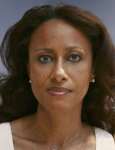 Sylviane Anna Diouf is a historian and writer of Franco-Senegalese origin. Diouf received a doctorate from the University of Paris VII and has taught at Libreville University in Gabon and New York University. She is the author of Dreams of Africa in Alabama: The Slave Ship Clotilda and the Story of the Last Africans Brought to America (Oxford University Press, 2007), which received the Wesley-Logan Prize of the American Historical Association and the James Sulzby Award of the Alabama Historical Association. Her book Servants of Allah: African Muslims Enslaved in the Americas (New York University Press, 1998) received awards and has raised notice for its detailed, well-written, and well-researched study of Muslims in the Americas from the sixteenth to the nineteenth centuries. Diouf is the editor of the critically acclaimed Fighting the Slave Trade: West African Strategies (Ohio University Press, 2003), the first book to study in detail African resistance to the slave trade. She has also coedited In Motion: The African-American Migration Experience (National Geographic, 2005).
Sylviane Anna Diouf is a historian and writer of Franco-Senegalese origin. Diouf received a doctorate from the University of Paris VII and has taught at Libreville University in Gabon and New York University. She is the author of Dreams of Africa in Alabama: The Slave Ship Clotilda and the Story of the Last Africans Brought to America (Oxford University Press, 2007), which received the Wesley-Logan Prize of the American Historical Association and the James Sulzby Award of the Alabama Historical Association. Her book Servants of Allah: African Muslims Enslaved in the Americas (New York University Press, 1998) received awards and has raised notice for its detailed, well-written, and well-researched study of Muslims in the Americas from the sixteenth to the nineteenth centuries. Diouf is the editor of the critically acclaimed Fighting the Slave Trade: West African Strategies (Ohio University Press, 2003), the first book to study in detail African resistance to the slave trade. She has also coedited In Motion: The African-American Migration Experience (National Geographic, 2005).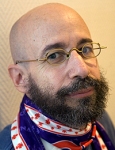 Arnold I. Davidson is Robert O. Anderson Distinguished Service Professor in philosophy, comparative literature, history of science, and philosophy of religion at the University of Chicago. He is also a member of the Committee on the Conceptual Foundations of Science at the University of Chicago and a professor at the Università di Pisa, Pisa, Italy. Davidson, who often speaks and teaches at French and Italian universities, has been a fellow of the Wissenschaftskolleg in Berlin as well as visiting professor and chaire d’Etat at the Collège de France. He is also the executive editor of the journal Critical Inquiry.
Arnold I. Davidson is Robert O. Anderson Distinguished Service Professor in philosophy, comparative literature, history of science, and philosophy of religion at the University of Chicago. He is also a member of the Committee on the Conceptual Foundations of Science at the University of Chicago and a professor at the Università di Pisa, Pisa, Italy. Davidson, who often speaks and teaches at French and Italian universities, has been a fellow of the Wissenschaftskolleg in Berlin as well as visiting professor and chaire d’Etat at the Collège de France. He is also the executive editor of the journal Critical Inquiry.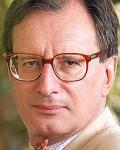 Jean-Luc Marion is among the best-known living philosophers in France and postmodern philosophy. He is a former student of Jacques Derrida and one of the leading Catholic thinkers of modern times. Marion’s take on the postmodern is informed by his expertise in patristic and mystical theology, phenomenology, and modern philosophy. Although much of his academic work has dealt with Descartes and phenomenologists like Martin Heidegger and Edmund Husserl, it is rather his explicitly religious works that have garnered much recent attention. God Without Being (University of Chicago Press, 1991), for example, is concerned predominantly with an analysis of idolatry, a theme strongly linked in Marion’s work with love and the gift, which is a concept also explored at length by Derrida. To a certain extent, Marion also takes up the mantle of Emmanuel Levinas in directing our thought beyond being.
Jean-Luc Marion is among the best-known living philosophers in France and postmodern philosophy. He is a former student of Jacques Derrida and one of the leading Catholic thinkers of modern times. Marion’s take on the postmodern is informed by his expertise in patristic and mystical theology, phenomenology, and modern philosophy. Although much of his academic work has dealt with Descartes and phenomenologists like Martin Heidegger and Edmund Husserl, it is rather his explicitly religious works that have garnered much recent attention. God Without Being (University of Chicago Press, 1991), for example, is concerned predominantly with an analysis of idolatry, a theme strongly linked in Marion’s work with love and the gift, which is a concept also explored at length by Derrida. To a certain extent, Marion also takes up the mantle of Emmanuel Levinas in directing our thought beyond being.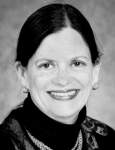 Susan McClary is a professor of musicology at Case Western Reserve University and is noted for her work combining musicology and a feminist music criticism. McClary received her PhD from Harvard University in 1976. Her doctoral dissertation was on the transition from modal to tonal organization in Monteverdi’s works. The first half of her dissertation was later reworked and expanded in her 2004 book, Modal Subjectivities: Self-fashioning in the Italian Madrigal (University of California Press, 2004). McClary is married to the musicologist Robert Walser.
Susan McClary is a professor of musicology at Case Western Reserve University and is noted for her work combining musicology and a feminist music criticism. McClary received her PhD from Harvard University in 1976. Her doctoral dissertation was on the transition from modal to tonal organization in Monteverdi’s works. The first half of her dissertation was later reworked and expanded in her 2004 book, Modal Subjectivities: Self-fashioning in the Italian Madrigal (University of California Press, 2004). McClary is married to the musicologist Robert Walser.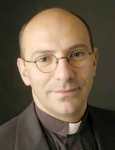 Mitri Raheb is a Palestinian Christian, pastor of the Evangelical Lutheran Christmas Church in Bethlehem, and founder and president of the Diyar Consortium, a group of Lutheran-based, ecumenically-oriented institutions serving the Bethlehem area.
Mitri Raheb is a Palestinian Christian, pastor of the Evangelical Lutheran Christmas Church in Bethlehem, and founder and president of the Diyar Consortium, a group of Lutheran-based, ecumenically-oriented institutions serving the Bethlehem area.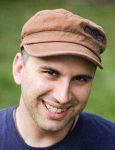 Peterson Toscano is a playwright, an actor, blogger, stand-up comedian, and gay activist. Before accepting his gay orientation and because of his conservative Christian beliefs, he spent nearly two decades submitting to ex-gay treatment and conversion therapy designed to alter his gay orientation and gender differences.
Peterson Toscano is a playwright, an actor, blogger, stand-up comedian, and gay activist. Before accepting his gay orientation and because of his conservative Christian beliefs, he spent nearly two decades submitting to ex-gay treatment and conversion therapy designed to alter his gay orientation and gender differences.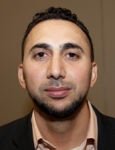 Rami Nashashibi has served as the Executive Director of the Inner-City Muslim Action Network (IMAN) since its incorporation as a nonprofit in January 1997. He has a PhD in sociology from the University of Chicago and has been an adjunct professor at various colleges and universities across the Chicago area, where he has taught a range of sociology, anthropology, and other social science courses. Nashashibi has worked with several leading scholars in the area of globalization, African American studies, and urban sociology and has contributed chapters to edited volumes by Manning Marabel and Saskia Sassen.
Rami Nashashibi has served as the Executive Director of the Inner-City Muslim Action Network (IMAN) since its incorporation as a nonprofit in January 1997. He has a PhD in sociology from the University of Chicago and has been an adjunct professor at various colleges and universities across the Chicago area, where he has taught a range of sociology, anthropology, and other social science courses. Nashashibi has worked with several leading scholars in the area of globalization, African American studies, and urban sociology and has contributed chapters to edited volumes by Manning Marabel and Saskia Sassen.